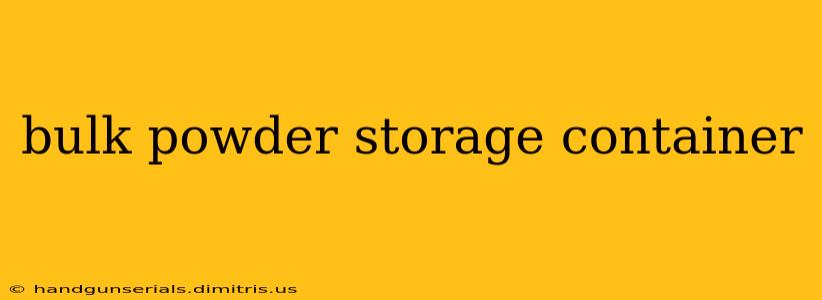Choosing the right bulk powder storage container is crucial for maintaining product quality, ensuring worker safety, and complying with industry regulations. This comprehensive guide explores various container types, materials, and considerations for optimal storage solutions.
Understanding Your Powder Storage Needs
Before selecting a bulk powder storage container, carefully assess your specific requirements. Key factors include:
-
Powder Properties: Consider the powder's characteristics, including its density, flowability, abrasiveness, hygroscopicity (ability to absorb moisture), and reactivity. These properties dictate the necessary container material and design. A highly abrasive powder, for instance, will require a more robust container than a fine, non-abrasive powder.
-
Storage Environment: The storage environment plays a significant role. Temperature fluctuations, humidity levels, and potential exposure to sunlight or contaminants must be factored in. For example, powders sensitive to moisture require airtight containers.
-
Storage Capacity: Determine the volume of powder you need to store. Options range from small containers for lab use to massive silos for industrial applications.
-
Handling and Transportation: Consider how the containers will be handled and transported. Will they be moved manually, by forklift, or via other automated systems? The container's size, weight, and design should facilitate efficient handling.
-
Regulatory Compliance: Comply with all relevant health and safety regulations, including those related to food safety (if applicable), hazardous materials, and environmental protection.
Types of Bulk Powder Storage Containers
Numerous options exist, each with its advantages and disadvantages:
1. Bags and Sacks:
- Pros: Relatively inexpensive, readily available, and suitable for smaller quantities.
- Cons: Prone to tearing, spillage, and contamination; less efficient for automated handling; limited protection against moisture and atmospheric conditions.
2. Drums and Barrels:
- Pros: Durable, relatively inexpensive, available in various sizes, and suitable for various powder types.
- Cons: Manual handling can be challenging; limited capacity compared to larger systems; potential for leakage.
3. Intermediate Bulk Containers (IBCs):
- Pros: Reusable, stackable, relatively easy to handle, and offer better protection than bags or drums.
- Cons: Higher initial cost compared to bags or drums.
4. Silos and Hoppers:
- Pros: High capacity, efficient for automated handling, and often equipped with features like dust collection and aeration systems.
- Cons: High initial investment, requires dedicated space, and may necessitate specialized handling equipment.
5. Flexible Intermediate Bulk Containers (FIBC) or "Super Sacks":
- Pros: High capacity, relatively lightweight, and cost-effective for large quantities.
- Cons: Not as durable as rigid containers, susceptible to damage from sharp objects.
Choosing the Right Material
The container's material is critical to prevent contamination and degradation of the stored powder. Common materials include:
-
Stainless Steel: Excellent corrosion resistance, suitable for food-grade and pharmaceutical applications. However, it can be expensive.
-
Plastic (HDPE, PP): Less expensive than stainless steel, but the choice of plastic depends on the powder's properties and the storage environment.
-
Carbon Steel: Cost-effective but prone to corrosion unless treated with protective coatings.
Essential Considerations for Safe and Efficient Storage
-
Proper Labeling and Identification: Clearly label containers with the powder's name, contents, date of manufacture, and any hazard warnings.
-
Storage Area Conditions: Maintain a clean, dry, and well-ventilated storage area. Protect against temperature extremes and direct sunlight.
-
Inventory Management: Implement a robust inventory management system to track stock levels and prevent product spoilage or obsolescence.
-
Regular Inspection: Regularly inspect containers for damage, leaks, or signs of contamination.
By carefully considering the factors outlined above, you can select the optimal bulk powder storage container to ensure product quality, safety, and compliance with industry standards. Remember to prioritize safety throughout the entire storage process.

